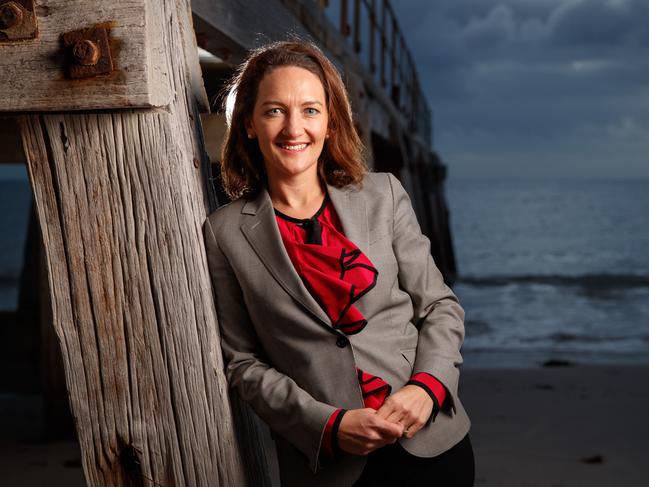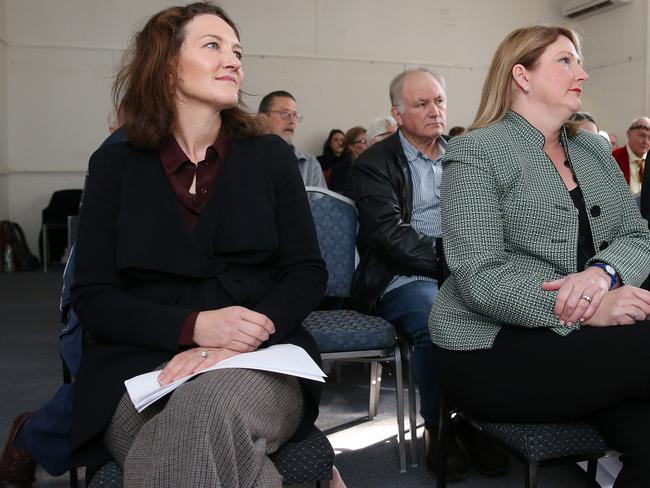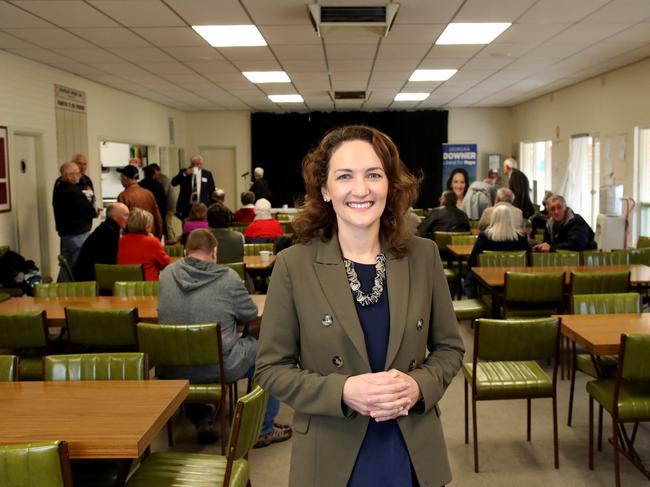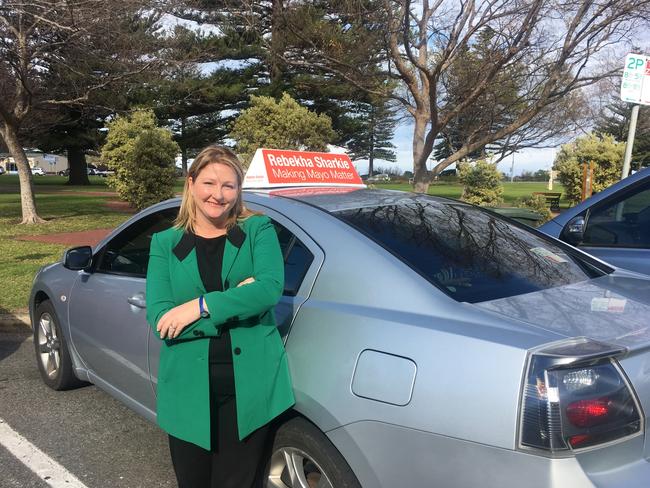Why Rebekha Sharkie is still leading the Mayo fight against Georgina Downer
CAN Rebekha Sharkie’s homespun optimism — with help from Labor and the Greens — stop underdog Liberal Georgina Downer forging a new chapter for an SA political dynasty?
HUDDLED around a wooden dining table at a Victor Harbor community radio station, Rebekha Sharkie is showing why her homespun campaigning style is pushing a 140-year-old South Australian political dynasty to the brink of extinction.
Barring a dramatic shift in opinion polls, Sharkie is the overwhelming favourite for next Saturday’s Mayo by-election. She is heading for a landslide victory over Liberal rival Georgina Downer, who counts two federal ministers and a premier among her antecedents.
More than 107,000 voters will cast their ballot in an electorate stretching from the Adelaide Hills, through the Fleurieu Peninsula to Kangaroo Island — on a so-called Super Saturday featuring five by-elections across the country.
Sharkie, the Centre Alliance candidate, is spending at least $300 a week on petrol to power a Mitsubishi 380, borrowed from her father, to all corners of the electorate she was forced to relinquish in May over her dual citizenship issues.
On July 4 — Independence Day in the United States — Sharkie’s latest stop in the Mitsubishi sedan is the delightfully named Happy FM, housed in a sprawling old bungalow in the heart of Victor Harbor. An upbeat Sharkie, who lives in Birdwood with her family, is telling interviewer and retired school principal Jan Potter about her 16-year-old son’s voluntary work at an aged care facility — in the electorate, of course.
In a snapshot of the personal touch that earned her a reputation as a strong local member, Sharkie oozes positivity and optimism during a discussion about bringing together older and younger people through mentoring.
“Last week my son, he’s 16 and he’s a bit of a budding muso, and part of their social justice is just-in-time volunteering in the community at his school. Him and his best mate spent the week at an aged care facility and he brought along his guitar. For the whole week he was helping feed, doing lots of things,” she enthuses.
“I said to him: ‘Mate, how did you go?’ He said: ‘Oh, I made some new friends — had a great time’. And he’s really keen to volunteer at that particular aged-care facility.
“It’s about building relationships across our community.”
Following her own mantra, Sharkie has worked hard at forging relationships across Mayo since capturing the seat at the 2016 federal election. Back then, she represented the Nick Xenophon Team and defeated former Liberal minister Jamie Briggs, who had been only the second person to hold the seat since its creation in 1984. The other, former federal Liberal leader and long-serving foreign minister Alexander Downer, is now looking on from the United Kingdom — having returned to Australia for a few weeks from May — as his daughter, Georgina, seeks to win the seat he held for 24 years, from 1984 to 2008.

This has created an unusually intriguing contest, particularly noteworthy for the contrasts — real and amplified for political reasons — between the two main contenders in a field of seven.
Georgina Downer was raised in the Adelaide Hills and schooled at Seymour College, where she achieved full marks in all five Year 12 subjects in 1997 and, subsequently, took a scholarship at the University of Melbourne. Now earmarked as a future Cabinet minister, her CV includes four years as a diplomat in Japan, working as a lawyer in Melbourne and, most recently, as an adjunct fellow at the right-wing Institute of Public Affairs think tank.
Hailing from a formidable political dynasty, Downer wants to follow the record of public service which began with her great-grandfather, Sir John Downer.
He represented the Barossa in State Parliament from 1878-1901 for the Conservatives, during which time he twice served as Premier and Attorney-General. Sir John was one of the founding fathers of the Australian Federation and served as an SA senator from 1901-03. He then represented the Southern District in the state’s Upper House from 1905-1915. Both his son, Sir Alexander “Alick” Downer, and grandson Alexander (Georgina’s father), lived in the Adelaide Hills and represented the area in the federal Parliament. Both were Liberal Cabinet ministers. Alexander was a federal Liberal leader.
Despite this esteemed background, Georgina Downer, 38, has been pilloried as a blow-in — having lived away from the state for 20 years — who is seeking to reclaim her family birthright. She moved her family from Melbourne on May 10, days before the Liberal preselection. Her children start school next week.
Downer is the underdog and Sharkie the overwhelming favourite, the virtual incumbent poised to sweep up preferences from Labor and the Greens in an informal, unwritten alliance of political convenience aimed at blocking the Liberals — particularly a Downer — from reclaiming their former heartland.
Born in Devon, England, Sharkie’s family moved to SA when she was two. Her father worked at Mitsubishi’s Lonsdale plant — hence the borrowed 380. At university, she handed out how-to-vote cards for Janine Haines, who became the Australian Democrats leader.
She was a paralegal in Darwin, returned to the Adelaide Hills to work in a similar role for a company operating African mines, then worked as a legal researcher for former Heysen MP and state Liberal leader Isobel Redmond — an unconventional politician like Sharkie. A former Liberal Party member, Sharkie also worked as senior manager in the youth sector.
At its simplest level, the by-election campaign has become a battle between Downer’s slogan that she will “Deliver more for Mayo” by being part of a governing party, versus Sharkie’s slogan that she will continue to “Make Mayo Matter” by exerting minor party influence on federal and state governments.
The Liberals argue Sharkie often sided with Labor in parliamentary votes and, as such, a vote for her will help Opposition Leader Bill Shorten become prime minister. Sharkie says she sided with the government for 49 per cent of votes. She paints herself as the David to the Liberal Goliath, fighting the government Establishment on a shoestring budget in a two-month campaign designed to deplete her meagre resources.
One senior Labor source told of sharing advice with Sharkie, suggesting she echo the Republican Senator Scott Brown, who in 2010 wrested from the Democrats the Massachusetts seat held by Edward Kennedy (of the famed American political dynasty) for nearly 50 years. Brown unleashed a killer campaign line that the Senate seat didn’t belong to any one person or political party but the people of Massachusetts.

“The seat of Mayo doesn’t belong to the Downers. It belongs to the people of Mayo,” Sharkie was advised to push as a campaign theme.
Sharkie sidesteps the question about whether this advice was relayed and her adherence to it. But, when SAWeekend travels with her, she is pitching herself as the people of Mayo’s champion. She steers the Mitsubishi sedan from her Mt Barker campaign office, in the cramped back room of a friendly Adelaide Rd accountancy firm, through Meadows and Mt Compass for a day campaigning in Victor Harbor and surrounds.
She meets an enthusiastic band of retirees for coffee, braces them for a Liberal leaflet assault in letterboxes, collects cable ties for electoral corflutes and, most importantly, mingles with shoppers on Ocean St, Victor Harbor.
On the main street, she meets Kimberley Fisher, 35, who, with husband Adam, runs Eco Child, a storefront and online business offering natural, sustainable and organic products for mothers and babies.
The parents of two young children moved from a small, two-bedroom Sydney apartment four years ago, drawn by the easygoing lifestyle of the seaside town in which they were married.
A self-described swinging voter, Fisher chats familiarly to Sharkie, who clearly has visited her shop before.
“I love that she shows her face around the community and she bothers to get to know the community. I feel like she listens to her community and advocates for us,” Fisher says. But what about Downer? “I don’t know her. I don’t know a thing about her, never seen her. The first I knew about her was when I saw her poster,” Fisher says.
At the opposite end of the political spectrum is Hayborough retiree Rosalie Panasewycz, who, almost a week after Sharkie’s visit, talks at length to Downer outside the Victor Harbor pre-poll station, further to the north on Ocean St. It’s July 10, and pre-poll voting has just opened. Downer is the only candidate handing out how-to-vote cards outside the former BankSA branch.
Panasewycz, 69, also moved to the South Coast with her husband four years ago, from Victoria, for the seaside lifestyle. She has a son in the military in Darwin and, on her side of the family, a heritage dating back to South Australia’s early days. Panasewycz is happy to declare why she voted for Downer.
“I like the girl, actually. I’ve read the whole policies. I’ve seen a lot of the things that Rebekha claims to stand for tend to be more council-oriented than our state and our country,” she says.
“There needs to be a national focus. We need to get this state working again.”
This is the centrepiece of Downer’s pitch. Her electoral posters declare: “Georgina Downer will deliver more for Mayo.”
It’s a theme directly pushed by Prime Minister Malcolm Turnbull in an interview with SAWeekend, during one of three campaign visits by July 4. Turnbull and a squadron of his ministers have visited to announce $10 million towards the $25 million cost of rebuilding a dated Mt Barker swimming pool, $750,000 to upgrade KI walking trails, $290,000 for road upgrades and a $200,000 contribution to the SteamRanger Heritage Railway.
This time, Turnbull’s here to announce BAE as the winner of a $35 billion contract to build nine frigates at Osborne’s naval shipyard and to visit Hahndorf-based family business Beerenberg with Downer.
Turnbull declares the $90 billion worth of submarine and shipbuilding contracts centred on Adelaide demonstrate the importance of holding the levers of power.
“It is a reminder that you have to be in government to get things done. The case we make for voting Liberal in Mayo and voting for Georgina Downer is that she will be part of my government and it is only government that can deliver projects like this. You have to be able to deliver,” Turnbull says.
“The jobs of the future are not somewhere else, which is what people in Adelaide have feared for quite a long time. They’re going to be right here.
“These ships (and) submarines are at the cutting edge of technology … and what that means is you’re going to get the smartest, most innovative technologies and people coming here and working here and getting opportunities here. “I think it is a real game changer for South Australia.”
The state might have had to contend with a population drain, as people leave in search of job opportunities, but parts of Mayo have experienced dramatic growth, putting pressure on schools, transport and other infrastructure.

There has been substantial demographic change since the last time a Downer was elected in Mayo — Alexander at the 2007 federal poll. Back then, he won primary support of 51.1 per cent and secured a 57-43 per cent two-party preferred vote.
The population of Victor Harbor, Goolwa and Mt Barker, in particular, has swollen as retirees and young families flock to affordable homes. At the 2006 census, Victor Harbor, Goolwa and Port Elliot had a combined population of 18,016. By the 2016 census, the same area housed 25,503 people.
Similarly, Mt Barker’s population soared from 11,540 in 2006 to 16,269 in 2016.
Older people have flocked to the South Coast — the Victor Harbor-Goolwa area has a median age of 58, well above the state’s median of 40. Mt Barker has become a haven for young families — the median age is 37.
Whatever the political effect of this change, Sharkie has been able to capitalise. She has behaved more like an independent than a minor party representative.
Even before Sharkie was forced to quit in May, she cannily kept a respectful public distance from Xenophon and has avoided the fallout from his implosion at the March 17 state election. Her campaign posters, literature and website rely on the personal brand she forged in two years in office. There is little, if any, mention of the Centre Alliance, the successor to the Nick Xenophon Team.
But Sharkie has honed and refined the people-first approach of her former mentor, narrowing Xenophon’s statewide focus as an Upper House member to the seat of Mayo. In a hyper-local approach, a campaign leaflet lists 30 community funding programs for which she claims to have secured finances as “the former member for Mayo”.
She “worked closely with our community to deliver” measures including an early-morning bus commuter service on the South Coast and a 24-hour doctor service at the Mt Barker Hospital. Clearly, both measures are implemented by the State Government. But Sharkie’s case is that she was the lightning rod for community pressure which made them happen. It’s a tactic once relished by Xenophon — become a champion for issues that matter to a community and force delivery through political pressure. Just as they were with Xenophon, her opponents are infuriated by Sharkie claiming credit for major projects, privately dismissing her community advocacy as letter writing without the financial and political responsibility of government. Sharkie’s campaign slogan, Making Mayo Matter, is an attempt to encapsulate this argument and hinges on the attention paid to the electorate since she captured it from Briggs.
“Keep yourself marginal. Marginal we matter. Three times the Prime Minister has been here in the last few weeks. That tells something to us all. We were ignored for so long. Please don’t let us go back to being ignored,” Sharkie says, in a 30-second pitch to a Mayo candidates forum at Nairne Soldiers’ Memorial Hall on July 4.
“I will stand up for us. I will not hide behind party lines. I will make sure that government is accountable. I will also work with government and I will work with the Opposition. I will work for us, getting as much as we possibly can for our community — not just focusing on the here and now, but the future for our community.”
Downer’s counterargument is, effectively, that Mayo needs to return to the Liberal fold to have a powerful voice directly influencing those holding the levers of power.
“What I’m offering to you is the commitment of a Hills girl who loves this community, who wants to be a really strong voice for you in Canberra, who will listen to you, who will deliver for you, because I am part of the party in government and can actually deliver for this community,” she tells the forum.
“I have a long-term vision, too. I’m not just about the here and now. I’m about fighting for you into the future and what we need to do today to make sure we have the best possible future for our community, in terms of infrastructure, in terms of jobs, in terms of alleviating cost-of-living pressures, so we can be strong and our children can have the best possible future.”
Without a dramatic change in the campaign, Downer is facing her second political defeat in little more than two years. In March, 2016, she lost in the first round of Liberal preselection for the Melbourne Liberal stronghold of Goldstein. Outgoing human rights commissioner Tim Wilson won the southeastern suburban electorate at that year’s federal poll.

Senior Liberal sources concede they do not expect Downer to win next Saturday, given the history of governments not capturing seats at by-elections. In this case, they say, the narrow local focus has hurt Downer, particularly because her opponents have aligned on emotive issues like opposing drilling in The Bight and defending the ABC.
But Liberals from both of the party’s Right and Moderate groups tip Downer to stand at a federal election expected within months. They argue the national focus, particularly a decision on a Turnbull or Shorten government, will promote the Liberal argument that a vote for Sharkie is a vote for Shorten.
By then, Downer will have been on the ground in Mayo for some months, with her family, blunting the attack about being a blow-in. Downer accuses her opponents of playing the woman, rather than the issues, in the attack on her recent return.
She says, with some validity, that many young South Australians have taken opportunities overseas and interstate before choosing to return. It is a popular argument with some voters outside the Victor Harbor pre-poll station, particularly the older ones who would like to see their grandchildren one day return.
Downer has impressed senior Liberals with her commitment to the daily grind of a lengthy campaign. This discipline, they expect, will hold her in good stead to overcome a potentially heavy by-election defeat. One Liberal pointed out that Downer’s father, Alexander, had failed attempts at Liberal preselection in the federal seat of Boothby in 1981 and state seat of Bragg in 1983 before finally prevailing in 1984 and winning Mayo. Perhaps, like her father’s close ally John Howard, the times will eventually suit Georgina Downer.
But she is reflexively tough and determined when asked whether she will contest the federal election if she loses next Saturday. “My plan is to win this by-election and then contest the next election as the federal member,” Downer says.
There’s one question which Downer can’t definitively answer until the by-election. Has her family heritage been more of a blessing or a curse in this lengthy campaign?
“Well, it’s who I am and I don’t shy away from it. My family over three generations has given a lot to South Australia — my great-grandfather, my grandfather and my father,” she says.
“They have loved this state and wanted to see this state flourish, particularly the Adelaide Hills and Fleurieu that my father represented, and Kangaroo Island.
“This is a region that we have, obviously, deep affinity for, having been deeply connected with it for over 100 years. I think people, in the main, respect that and recognise that we’re a family committed to public service — service to this state and this community.”
Next Saturday, Mayo voters will decide the immediate fate of this family dynasty. Appropriately, the people will decide whether a Downer is again representing the area or the latest member, Rebekha Sharkie, returns to the federal Parliament.
Whatever the result next Saturday, it’s likely to be only the first chapter in an intriguing political story.

